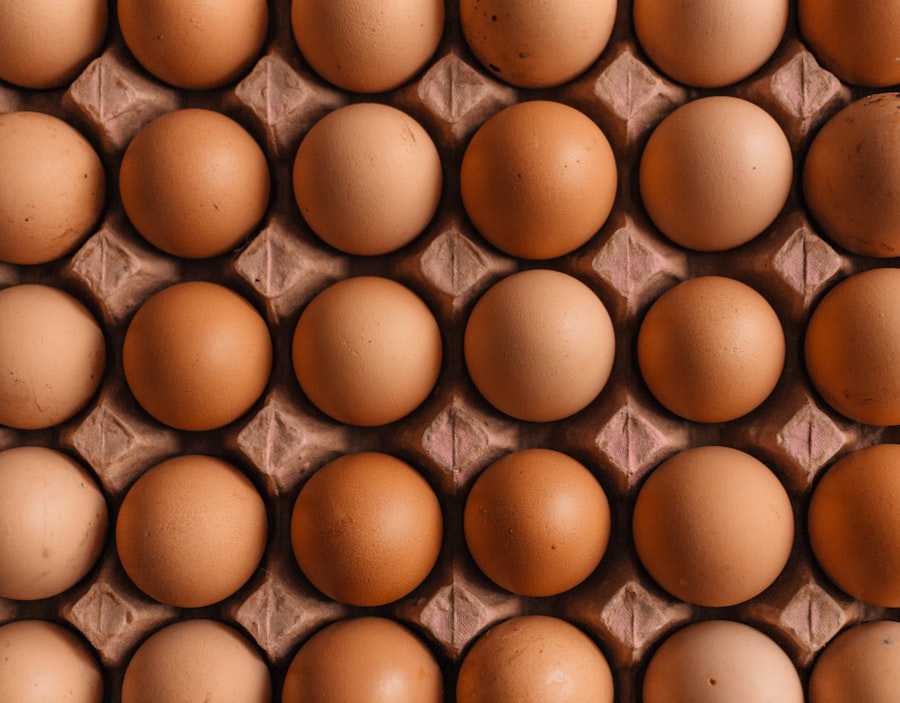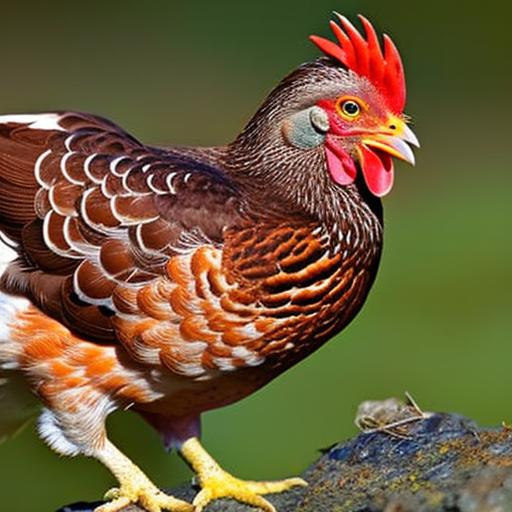Choosing the right chicken breeds for your coop is a crucial decision that can greatly impact the health and happiness of your flock. Different breeds have different characteristics and needs, so it’s important to select breeds that are well-suited to your specific circumstances. In this article, we will explore the importance of choosing the right chicken breeds for your coop and discuss some factors to consider when making this decision.
Key Takeaways
- Choosing the right chicken breeds for your coop is crucial for the safety and well-being of your flock.
- Factors to consider when choosing chickens include temperament, egg-laying ability, and hardiness.
- The top 3 chicken breeds for keeping out of harm’s way are Rhode Island Reds, Plymouth Rocks, and Australorps.
- Rhode Island Reds are a robust and hardy breed, Plymouth Rocks are dual-purpose and ideal for small flocks, and Australorps are docile and easy-to-manage for beginner chicken keepers.
- Ensuring your chicken coop is safe and secure and taking precautions against predators are essential for a happy and healthy flock.
Understanding the Importance of Choosing the Right Chicken Breeds for Your Coop
Choosing the right chicken breeds is crucial for the health and safety of your flock. Different breeds have different temperaments, sizes, and abilities, which can affect how well they adapt to their environment and how they interact with other chickens. For example, some breeds are more prone to aggression or stress, while others are more docile and easy-going. By selecting breeds that are well-suited to your specific circumstances, you can help ensure a safe and harmonious flock.
Additionally, different chicken breeds have different needs when it comes to climate, space, and purpose. Some breeds are better suited to cold climates, while others thrive in warmer environments. Some breeds require more space to roam and forage, while others are content in smaller areas. And some breeds are specifically bred for egg production, while others are better suited for meat production or as dual-purpose birds. By considering these factors when choosing your chicken breeds, you can provide the best possible care for your flock.
Factors to Consider When Choosing Chickens for Your Coop
When selecting chicken breeds for your coop, there are several important factors to consider. First and foremost is climate. If you live in a cold climate, you’ll want to choose cold-hardy breeds that can withstand low temperatures and harsh conditions. On the other hand, if you live in a hot climate, you’ll want to choose heat-tolerant breeds that can handle high temperatures.
Space is another important factor to consider. Some breeds are more active and require more space to roam and forage, while others are content in smaller areas. If you have limited space, you’ll want to choose breeds that are well-suited to confinement.
Purpose is also an important consideration. If you’re primarily interested in egg production, you’ll want to choose breeds that are known for their high egg-laying abilities. If you’re interested in meat production, you’ll want to choose breeds that are known for their meat quality and growth rate. And if you’re looking for dual-purpose birds, there are breeds that excel in both egg production and meat quality.
Top 3 Chicken Breeds for Keeping Out of Harms Way
When it comes to keeping your flock safe from predators, there are certain chicken breeds that are known for their ability to stay out of harm’s way. These breeds have characteristics that make them less vulnerable to predators and more adept at defending themselves.
One of the top chicken breeds for keeping out of harm’s way is the Rhode Island Red. Rhode Island Reds are known for their robust and hardy nature, which makes them less susceptible to illness and predation. They are also excellent foragers and can find their own food, reducing the risk of attracting predators to your coop.
Another breed that is known for its ability to stay safe from predators is the Plymouth Rock. Plymouth Rocks are a dual-purpose breed that is ideal for small flocks. They have a calm and friendly temperament, which makes them less likely to engage in aggressive behavior or attract unwanted attention from predators.
Australorps are another breed that is known for their ability to stay safe from predators. They have a docile nature and are easy to manage, making them a good choice for beginner chicken keepers. Australorps are also excellent layers, so they can provide a steady supply of eggs while also keeping your flock safe.
Rhode Island Reds: A Robust and Hardy Breed for Your Coop
Rhode Island Reds are a popular choice for backyard chicken keepers due to their robust and hardy nature. They are known for their ability to withstand harsh conditions and are less susceptible to illness and predation. This makes them a good choice for keeping your flock safe and healthy.
Rhode Island Reds are also excellent foragers, which means they can find their own food and reduce the risk of attracting predators to your coop. They are active birds that enjoy scratching and pecking at the ground, so providing them with plenty of space to roam and forage is important.
While Rhode Island Reds are generally low-maintenance, they do have some special care requirements. They require a balanced diet that includes a good quality chicken feed, as well as access to fresh water at all times. They also need a clean and secure coop that provides protection from the elements and predators.
Plymouth Rocks: A Dual-Purpose Breed Ideal for Small Flocks

Plymouth Rocks are a dual-purpose breed that is ideal for small flocks. They are known for their calm and friendly temperament, which makes them less likely to engage in aggressive behavior or attract unwanted attention from predators.
Plymouth Rocks are also good layers, so they can provide a steady supply of eggs while also contributing to a safe and happy flock. They are medium-sized birds with sturdy builds, which makes them less vulnerable to predation.
When it comes to care requirements, Plymouth Rocks are relatively low-maintenance. They require a balanced diet that includes a good quality chicken feed, as well as access to fresh water at all times. They also need a clean and secure coop that provides protection from the elements and predators.
Australorps: A Docile and Easy-to-Manage Breed for Beginner Chicken Keepers
Australorps are an excellent choice for beginner chicken keepers due to their docile nature and easy-to-manage characteristics. They are known for their calm and friendly temperament, which makes them easy to handle and less likely to engage in aggressive behavior.
Australorps are also good layers, so they can provide a steady supply of eggs while also being easy to care for. They are medium-sized birds with sturdy builds, which makes them less vulnerable to predation.
When it comes to care requirements, Australorps are relatively low-maintenance. They require a balanced diet that includes a good quality chicken feed, as well as access to fresh water at all times. They also need a clean and secure coop that provides protection from the elements and predators.
How to Ensure Your Chicken Coop is Safe and Secure
Ensuring that your chicken coop is safe and secure is essential for the health and well-being of your flock. There are several steps you can take to make sure your coop is predator-proof and provides a safe environment for your chickens.
First, make sure your coop is properly constructed and free from any gaps or holes that predators could squeeze through. Use sturdy materials and reinforce weak points to prevent predators from gaining access to your flock.
Second, install secure fencing around your coop to keep out larger predators such as dogs or coyotes. Make sure the fencing is buried at least a foot into the ground to prevent predators from digging under it.
Third, use netting or wire mesh to cover any openings or windows in your coop. This will prevent predators from reaching through and grabbing your chickens.
Finally, make sure your coop is well-lit at night to deter nocturnal predators. Install motion-activated lights or use timers to ensure that your coop is well-lit during the hours when predators are most active.
Tips for Keeping Your Chickens Safe from Predators
In addition to ensuring that your coop is safe and secure, there are several other steps you can take to keep your chickens safe from predators.
First, be vigilant and aware of potential threats. Keep an eye out for signs of predators in your area, such as tracks or droppings. If you notice any signs of predators, take immediate action to protect your flock.
Second, provide your chickens with plenty of hiding places and cover. This can include shrubs, bushes, or even large rocks or logs. These hiding places can provide your chickens with a safe place to retreat to if they sense danger.
Third, consider using a guard animal to help protect your flock. Dogs or even geese can be effective at deterring predators and providing an extra layer of security.
Finally, avoid attracting predators to your coop by keeping it clean and free from food scraps or other attractants. Regularly clean out your coop and dispose of any waste in a secure manner.
Choosing the Right Chickens and Coop for a Safe and Happy Flock
In conclusion, choosing the right chicken breeds for your coop is crucial for the health and happiness of your flock. Different breeds have different characteristics and needs, so it’s important to select breeds that are well-suited to your specific circumstances.
Factors such as climate, space, and purpose should be considered when choosing chicken breeds. By selecting breeds that are well-suited to your specific circumstances, you can provide the best possible care for your flock.
Additionally, ensuring that your chicken coop is safe and secure is essential for the health and well-being of your flock. By following the tips and advice provided in this article, you can create a safe and happy environment for your chickens.
If you’re looking for the best chickens to keep out of harm’s way, you might also be interested in learning how to care for goslings. Goslings require special attention and care, and this article from Poultry Wizard provides valuable insights on how to ensure their well-being. From feeding and housing to health considerations, this comprehensive guide will help you raise healthy and happy goslings. Check it out here: https://poultrywizard.com/breeding-geese/how-to-care-for-goslings/.
FAQs
What are the best chickens for keeping out of harms way?
The best chickens for keeping out of harms way are those that are docile, alert, and have good instincts for self-preservation.
What breeds of chickens are known for being docile?
Some breeds of chickens that are known for being docile include the Buff Orpington, Plymouth Rock, Sussex, and Wyandotte.
What breeds of chickens are known for being alert?
Some breeds of chickens that are known for being alert include the Leghorn, Rhode Island Red, and Easter Egger.
What instincts do chickens have for self-preservation?
Chickens have instincts for self-preservation that include being able to sense danger, being able to fly or run away from danger, and being able to hide or take cover.
What are some tips for keeping chickens safe from predators?
Some tips for keeping chickens safe from predators include keeping them in a secure coop at night, using electric fencing or netting, keeping the coop and surrounding area clean and free of food scraps, and providing plenty of hiding places and cover.
Meet Walter, the feathered-friend fanatic of Florida! Nestled in the sunshine state, Walter struts through life with his feathered companions, clucking his way to happiness. With a coop that’s fancier than a five-star hotel, he’s the Don Juan of the chicken world. When he’s not teaching his hens to do the cha-cha, you’ll find him in a heated debate with his prized rooster, Sir Clucks-a-Lot. Walter’s poultry passion is no yolk; he’s the sunny-side-up guy you never knew you needed in your flock of friends!







